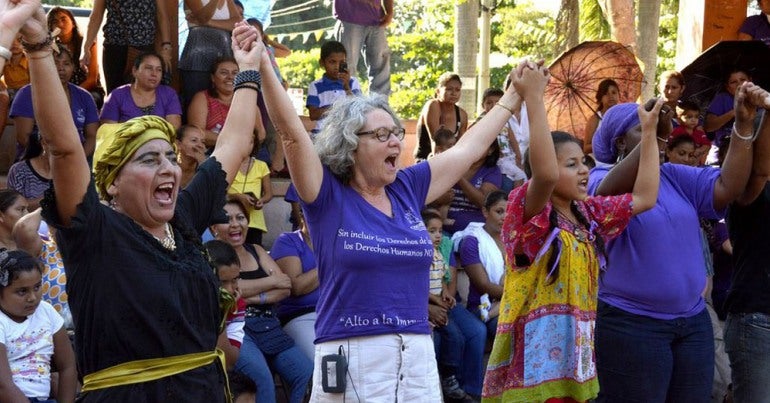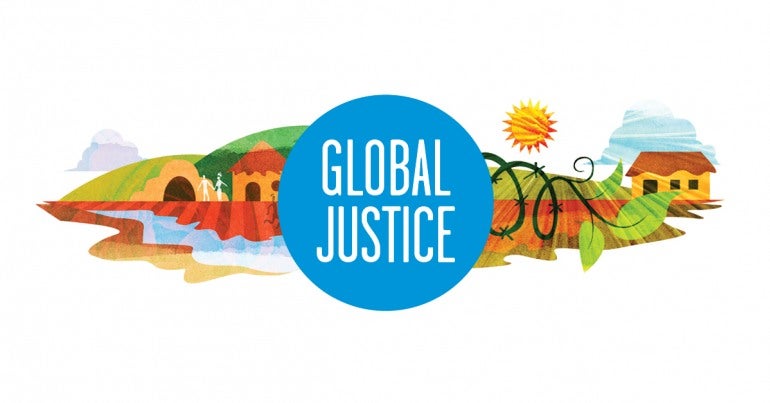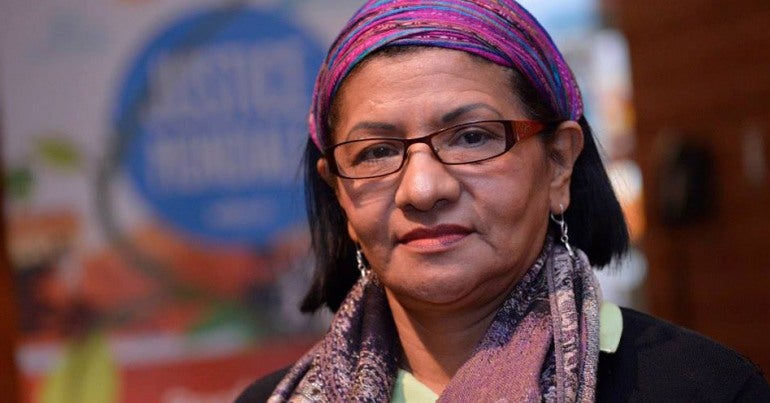A big portion of CUPE’s international solidarity work is carried out in conjunction with our global partners. Our Global Justice Fund supports various social movements and their organizations around the world.
Honduras
Honduras continues to experience extremely high rates of violence and impunity. Violence against women continues to rise, as does violence and intimidation against activists, particularly those involved in land disputes.
In March 2016, leading environmental and indigenous activist Berta Cáceres and co-founder of the Council of Indigenous Peoples of Honduras (COPINH) was assassinated in her hometown for her work with the Rio Blanco community against the construction of a hydro-electric dam on the River Gualcarque. Initial reports on the investigation into her death seem to indicate that her assassination is being framed as a result of internal conflict within COPINH, a particularly troubling development indicative of increased repression and criminalization of dissent. Ms. Cáceres’ murder comes after the Inter-American Commission on Human Rights ordered the State of Honduras to provide precautionary measures for Ms. Cáceres, orders with which the Honduran government, which behaves with impunity, did not comply with.
Empowering women maquila workers in occupational health and safety
CUPE’s work with the Honduran Women’s Collective (CODEMUH) aims to contribute to the transformation of practices that violate human, gender and labour rights of women workers in maquilas in Honduras. A maquila is a foreign-owned factory at which lower-paid workers assemble imported parts into products for export. CODEMUH’s work focuses on occupational health and safety and social security in the workplace, through research and advocacy to achieve systemic change at the national level, as well as providing direct legal and medical accompaniment to women workers who have suffered workplace injuries or labour rights violations.
Working with a specialist in occupational health and safety in the maquila industry, CODEMUH provided medical services to over 30 workers suffering from musculo-skeletal injuries and illnesses. In addition to providing medical care for injured workers, CODEMUH has been able to scientifically demonstrate the link between the working conditions in maquilas and various musculo-skeletal injuries and illnesses.
They have obtained permanent accommodations for maquila workers, and the Honduran Social Security Institute has recognized new musculo-skeletal injuries as work-related, a major accomplishment as this qualifies workers for state disability pensions.
Nicaragua – Taking action to defend the labour and gender rights of women maquila workers (MEC)
In January 2016, the government in Nicaragua passed legislation increasing the minimum wage in free trade zones by 8 per cent. With a core inflation rate of 5.85 per cent, this raise, while overdue, is significant. In 2015, maquila sector workers received a 0 per cent increase while other sectors saw their salaries increase. Given that women represent 75 per cent of workers in the maquila sector, this is a clear example of systemic discrimination against women.
CUPE supports the María Elena Cuadra Movement (MEC) as they seek to improve the ability of workers to defend their human and labour rights from a gender perspective. MEC works towards this goal by offering legal support on labour and gender rights through their legal clinic, and through education and organizing with maquila workers and activists.
MEC is a remarkable organization that has earned a national and regional profile in Nicaragua and Central America. From their origins as a small group of women organizing underground and facing violent repression for their work to improve conditions in the maquila sector, they have become a respected national organization to whom the media frequently call on for interviews, and who are capable of representing thousands of workers by dealing directly with officials from the Ministry of Labour and the National Commission of Free Trade Zones.
This year, MEC’s legal clinic served over 3,000 people, and resolved cases on labour rights violations in the maquila, service and household domestic sector. They provided legal services on cases of violence against women, and assisted women seeking enforcement of court-ordered child-support payments. These services are all offered free of charge. In addition to direct legal services, MEC also seeks to prevent abuses at the source by educating workers on their basic labour rights. MEC printed and distributed over 10,000 pocket manuals on the ABCs of labour rights.
Colombia – Global defence of human rights in southwest of Colombia (NOMADESC)
Colombia is in the midst of ongoing peace negotiations between the Government of Colombia and the FARC (Revolutionary Armed Forces of Colombia). While peace negotiations continue, violations of basic human rights and social, economic and cultural rights are ongoing.
CUPE supports NOMADESC in Colombia in their efforts to empower grassroots social movements in the southwest of Colombia through the construction of a transformative, holistic and participatory peace proposal. Their work focuses on increasing the capacity of grassroots communities through education, research, legal support, public campaigns and advocacy.
While the advances made in the peace process are encouraging, Colombia continues to experience high levels of human rights abuses. NOMADESC reports ongoing violence from paramilitary and criminal bands, state armed forces, and insurgency forces, and continued displacements of communities due to natural resource exploration and extraction, large infrastructure projects, and control of drug trafficking routes.
NOMADESC aims to educate and empower communities through their newly developed Intercultural University of the Peoples, where diverse social movements and communities come together to share their struggles for social justice, acquire tools to defend their human rights, and develop plans and actions to address human rights violations in their communities and to make their voices heard in Colombia’s ongoing peace process. NOMADESC also provides legal assistance and accompaniment to communities and carries out strategic litigation and advocacy on cases of human rights violations. CUPE aims to raise awareness amongst Canadians about the current context of Colombia, the role of Canadian corporations and government in Colombia, and the importance of international solidarity.
Colombia – Community work to support public water (SINTRACUAVALLE)
The Colombian government continues to promote its program “Water for Prosperity” to hand over public water infrastructure to private corporations. The threat of privatization in Colombia is constant, and has accelerated with the numerous free trade agreements the Colombian government has signed since 2012. For example, the Colombian government recently sold a majority share of its public hydro company ISAGEN to a Canadian company, Brookfield Asset Management Inc. in spite of major protests throughout Colombia and allegations of corruption in the negotiation of the sale. Opponents to the government’s neoliberal growth plan continue to suffer threats and attacks.
SINTRACUAVALLE, the union representing workers in the public water company ACUAVALLE, has a long history of successfully opposing attempts to privatize the public municipal water system in Valle del Cauca, Colombia. A key part of their strategy has been educating the public about the importance of water as a public service and the impacts of privatization of water. To build support for the public delivery of water, SINTRACUAVALLE builds alliances with the general public, civil society organizations and government workers and officials to increase awareness of the impacts of the privatization of water. They work to explain the role of SINTRACUAVALLE workers in ensuring all municipalities have access to potable water, and raise the alarm about the Colombian government’s current plans for privatization of public water.
CUPE works with SINTRACUAVALLE to support their efforts to strengthen public support for water as a public service in the municipalities of the Valle del Cauca region of Southwestern Colombia. Our project work aims to strengthen opposition to private investment and control of water infrastructure through public-private partnerships, and to build solidarity and awareness between Canadians and Colombians that water is a human right.
Margarita López, president of SINTRACUAVALLE has received numerous death threats for her work in defence of water as a public good, and cannot leave her home unless accompanied by bodyguards. In spite of these constant threats, SINTRACUAVALLE remains firm in their defence of water as a human right. In the coming years they plan to focus on outreach to recently-elected municipal leaders to build on their work for public support for public water.
CUBA – Strengthening solidarity between Cuban public sector union (SNTAP) and CUPE
CUPE has been working with the Havana local of Cuba’s National Union of Public Sector Workers (SNTAP-Havana) for many years in order to deepen solidarity and to strengthen the capacity of trade unions in Cuba to promote union activism and leadership.
Recent changes to Cuba’s labour law create new challenges for Cuba’s union sector. The Cuban state has formally opened several areas of the economy to private businesses, including small enterprises and self-employment, and converted numerous state enterprises into worker cooperatives. These workers are still able to affiliate with public unions, and SNTAP and SNTAP-Havana have been working to sign up members. The Cuban government has also introduced profit sharing for employees in income-generating enterprises, and has also decentralized decision making. These changes make SNTAP-Havana’s training program highly relevant as union leaders and activists adapt to a changing context so that they may continue to effectively promote workers’ rights.
SNTAP-Havana provides education and training to shop stewards, municipal and provincial level leaders on labour legislation, workplace health and safety and negotiation of collective agreements.
In 2015-2016, SNTAP-Havana began refurbishing a new classroom in the provincial labour central’s building. In Canada, CoDevelopment Canada (CoDev) works with CUPE BC to deepen members’ understanding of the issues facing Cuban workers through reports and presentations and by facilitating participation in events in Cuba when possible.
Philippines – Worker-to- worker solidarity with the Alliance of Concerned Teachers (ACT) to build grassroots unionism in the education sector
Over the past few years, CUPE has supported the Alliance of Concerned Teachers (ACT) to build public sector unions throughout the country. ACT is now the largest union of public employees in the Philippines, with 133,910 members.
Beyond allowing union organizing and collective bargaining, ACT Philippines hopes the 2016 National and Local Elections will result in a temporary halt to the militarization faced by their indigenous brothers and sisters in Mindanao, and will allow for a review of the recently implemented K to 12 curriculum.
ACT is an active member of a civil society coalition called the Save our Schools Network who have been assisting teachers and students of the Indigenous Peoples’ schools from Mindanao. The teachers and students fled due to the continuing militarization, threats, intimidation, harassment, and killings of their leaders and family members perpetuated by the members of the Armed Forces of the Philippines and other armed groups associated with them.
The implementation of the K to 12 curriculum is a concern for ACT because it aligns the education system in the Philippines with the labour needs of other countries. The new curriculum is aimed at producing semi-skilled graduates needed abroad in the health and education sectors.
PHILIPPINES – Worker-to-worker solidarity with the Confederation for Unity, Respect and Advancement of Government Employees (COURAGE)
CUPE’s work with the Confederation for Unity, Recognition and Advancement of Government Employees (COURAGE) in the Philippines has focused on strengthening its anti-privatization campaign in the water sector, both at the municipal and provincial level.
Public sector workers’ unions, concerned legislators, local government officials and other civil society organizations are now working more closely together in the Philippines to expose and oppose privatization in all forms. Workers’ solidarity with communities became more pronounced when they realized that they cannot win the war against privatization by themselves. The unions who worked closely with various grassroots organizations have, over time, become more socially conscious and have realized that their wages, job security issues and union concerns are directly intertwined with the communities’ problems and struggles.
Public employees are also realizing the importance of asserting their rights to organize themselves despite the risks of being tagged as anti-government.
In April 2015, union leaders from three affiliated unions of COURAGE received grave threats from unidentified men believed to be personnel of the Armed Forces of the Philippines and the Philippine National Police. They were tagged as members of the Communist Party of the Philippines and were directed to turn themselves in and cooperate with authorities or face the consequences of their supposed anti-government actions. From an initial six documented cases of direct threats, poison letters and unwelcome visits at these union leaders’ homes, the list grew to include not just the union leaders from the National Housing Authority, National Food Authority, Department of Labor and Employment, Department of Social Welfare and Development, but also COURAGE office staff and organizers.
Cases were filed at the Commission on Human Rights and at the Supreme Court which sought the protective custody of the courts for the victims. Specific attention was also requested from the International Labour Organization and the United Nations’ Human Rights Commission. International rights’ organizations and trade unions also responded by condemning the threats on the life and liberty of the victims.




